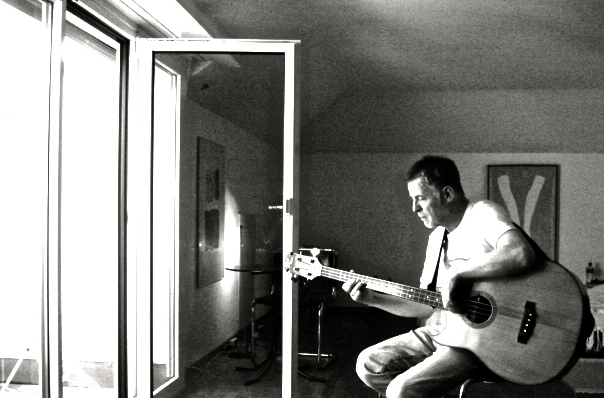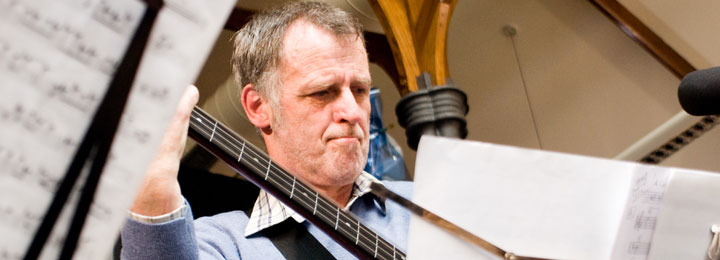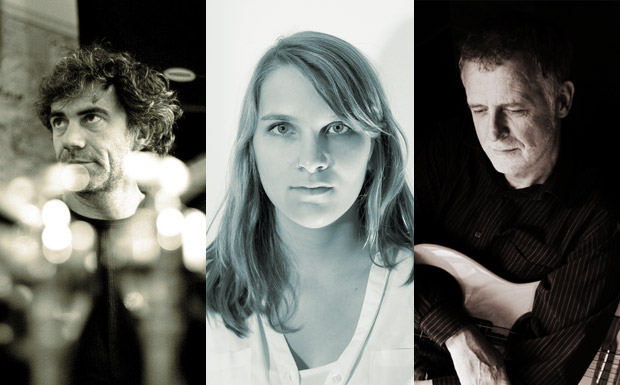A CHAT WITH: RONAN GUILFOYLE
aaamusic | On 15, Feb 2015
Irish bassist Ronan Guilfoyle has taken up residency at the Irish Cultural Center for the past three weeks, where he’s been writing for his upcoming concert on Thursday 12th. He will play for the first time with French drummer Christophe Lavergne and Swiss pianist Marie Krüttler. Ronan’s work is his whole life: it is a family affair, a childhood affair, a friendly affair, and it is as much writing as playing and teaching. Marguerite Gallorini chatted to him ahead of his concert, which promises to be full of surprises.
Hi Ronan. First of all, you are about to release a new recording: would you like to say a few words about it?
Yes, I made this new recording last year in New York, with two great musicians, Tom Rainey on drums and Dave Binney on saxophones, as well as my son Chris at the guitar. These all are original compositions, and I think the release should be in April 2015. I’ve been going back and forth between all the different ways to release it – it’s a bit of a hell to organize, to negotiate with the labels… I think it’ll be easier to create my own label and release it that way! But I do want to have an album: in my view you need to have a CD. It is what an exhibition is to a painter: you get to show, in one final product, the work you have been putting for the past weeks, months or years, and you get to decide of the order – which piece you want to show first, etc. A CD is an artistic statement.
What would you like to say about your Guilfoyle/Nielsen Trio (with guitarist Mike Nielson and your brother Conan on drums)?
Ah yes, we played together for twenty years. It was a dynamic that could not be reproduced anywhere else: we were all good friends and knew each other so well. It’s just like with your best friend: you have spent so much time together that you know everything of each other’s lives, you know each other’s ideas on important subjects like politics or religion to the point that you don’t need to talk about these things anymore. Then it’s just a matter of easy, daily adjustments.
Why did you stop playing together?
We never actually said “ok we’re breaking up”. But life happened, and we just drifted apart because we all had different priorities, families, children… it came naturally to a point where it stopped. But last September we performed in Dublin, the first time in five years, that was great. We had a hard time working, because we were laughing so much all the time! When you get together again like that, it is so easy, it makes you remember why you had spent so much time together in the first place.
It’s funny how you describe it all, it really sounds like getting back together with an ex!
But it is! It’s like when you meet with your ex again, all these things are so easy and you see why you had gotten together in the first place; then again, you are also faced again with the reasons why you are not together anymore haha!
Going back in time: how did you enter the world of music?
Thanks to my father. He was not a musician, but he listened to modern jazz and classical music: Ravel, Debussi, Prokoviev, Charlie Parker, Miles Davis, Mingus, Coltrane… He would play it a lot and was very evangelistic about it – and since there were speakers even in the downstairs room, there was no escaping it! He would sit me and my siblings down on the couch, tell us “you’re the clarinet – you’re the violin – you’re the cello”, and you had better do what he told you; so we would listen to the CD and try to recognize the instrument we had been assigned… It really was a great musical education. Actually the album I’ve released in 2012, Renaissance Man, is a tribute to my father.
When did you start playing and composing for the first time?
I was a late starter, I was eighteen, and I played right away bass guitar. I was self-taught, but I had a great culture from my father. And I soon felt the desire to write music; my very first jazz composition was for a jazz trio, a simple blues piece really. But years later, I used it as the final movement of my violin orchestra in 1998. Here again for composition, I was self-taught since there weren’t any jazz school in Ireland.
I remember once, I was playing Night and Day with older musicians, and I started playing it with the wrong chord. At the end of the song, the pianist asked me “what chord were you playing at the beginning?” I sheepishly answered and then asked which he had played, and he told me “I played what Porter wrote”. Ouch! And he never told me what it was! That was how you learnt in those days: you were told you didn’t play right, but you were never taught how to play right; it was with repetition, practicing over and over again, that you then felt which way was the right way.
But back to composing, I wrote my first classical piece for violin and piano in 1994. I knew classical music from my culture, and so I undertook to study Prokoviev, his score and his recordings for a while before writing my own. For several days, I was thinking “man, that is so brilliant, I just can’t do this”. But then I decided to do my own thing, and not try to write like him. So I accommodated the things I knew to write already: for the first movement I drew from Montuno salsa bands’ influences, coupled to Bartók’s scales; for the second movement I took Indian music’s rhythms coupled to the pentatonic scale, and so on and so forth. That’s pretty much how I’ve worked ever since.
What do you find most fulfilling in the different stages of the whole musical process: writing, playing, listening, or teaching?
Ultimately, I would have to say playing. All the other things are about playing: performance is the goal of all them, the most vital part. I love composing though, it is a very seductive thing – and you don’t have to travel and organize yourself and all of these things that you have to do in order to perform, in order to get to the pleasure of the action. As for teaching, I guess I do have that evangelist streak from my dad. I guess I deem it as a very valuable thing because I myself never had this kind of education, to learn how to go where you want faster. I think school is very important; but it is also a very safe environment… It doesn’t foster the spontaneous side of music, it is always kind of controlled there. Whereas in the real world, you’re just thrown out there and you have to show yourself.
And, there’s something about playing jazz in particular that cannot be reproduced with anything else. It has a strange aesthetics: you’re supposed to play for the benefit of the group, so you really have to listen; but at the same time, individuality is encouraged, and that’s how great figures like Parker, Coltrane and others could distinguish themselves. I think individuality is in danger nowadays; it’s getting harder everyday to stand out. Cultures are being bulldozed, everyone is urged to look the same, dress the same, listen to the same things, use the same technology…
In my view, these are the values of jazz that are under threat, and therefore getting even more valuable. For a young person to engage in jazz and follow this path is already the statement that you don’t want to be like everyone else, have the same job and the same daily life as other people; it shows something, and I’m glad some have the guts to do it.
Which is kind of how jazz was born in the first place: as a sub-culture musical movement…
For sure; it was born from the African American under-class, and White people who played jazz afterwards were likened to that. I guess nowadays jazz is still a sub-culture, but for different reasons that the ones for which it was initially created.
About this coming night: you will play with Christophe Lavergne (drums) and Marie Krüttli (piano). Were they students of yours?
Well it’s more complicated than that. They were students when I met them, but they were not my own. I met Christophe while he was attending a summer school where a friend of mine, who’s married to a French woman, was playing. As for Marie it’s different: I’ve been an external examinator for a Master’s programme in Switzerland for ten years, and when I heard Marie – she was 23 at the time – I thought she was absolutely outstanding. It was not just about technique – she had it obviously – but I was amazed that someone so young could be able to make such great decisions in his/her playing. Many students get better after playing a lot, but she got it already.
It will be the very first time all three of you will play together, on Thursday. What can you say about the pieces you’re going to play?
These will all be original pieces, which I’ve been writing during my three weeks here in Paris. I’ve planned something along the theme of “three”: so our trio will be called Ternary, and the compositions I’ve made consist of three groups of three pieces each; as for the title of the suite, it is based on my struggle to learn French (I have been trying to speak French for a long time but then it’s hard because everyone answers in English)! So the suite is called Grammaire. The first movement is called “Passé-composé” (past tense), and is about my passed history with the French language; the second one is “Présent”, dealing with my three recent weeks here, composing in Paris; and the third one is “Futur”, and has not been written yet: we don’t know the future, so this movement will consist of our improvisation on the spot.
How is performing here compared to Ireland and elsewhere? Do you feel a difference in the audiences?
There is. Some are more attentive and respectful, like in Germany; others are noisier, like in America. It’s actually a shame, because on old recordings of live concerts of great jazz bands and artists like Davis, you hear a lot of noise over the music… Here’s a funny story: Mingus was known for having a certain temper; so during one of his band’s concerts, there were four businessmen on the front that didn’t stop talking. Mingus stopped the band, took the microphone and stepped down the stage, sat at the businessmen’s table and held the microphone in front of them, saying “apparently you have something to say that is more interesting than my band’s music, so please share it with us”!
But as for myself, I would say I’m more comfortable at home in Ireland, for the simple reason that I’ve played there more than anywhere else, so proportionally I’ve had a lot of great gigs there. I also really enjoy India; and last week in Paris, at the Atelier du Plateau, the audience was great, it was definitely a good concert!
What’s your next destination?
Next week I’ll be in Dublin and London, before going to Cape Town, where I’ll be playing with fantastic South African musicians. Music really is an international language. I would say there are three great international genres in music: the first one is jazz, the second is Western classical music, and the third would be rock/pop music. I really appreciate young musicians everywhere; it’s really incredible what these kids can do nowadays. Have you seen the video of the 8-year-old Indonesian boy who plays jazz standards like grown musicians can hardly do? It’s amazing.
I haven’t, I’ll have to check that out! Anything else you’d like to add?
Well if I had one last thing to say, it would be to tell people to support live music! Go to concerts and pay for them, that is the only way. It is a lot of work and money to record an album… but now if you sell 20 CDs you’re lucky. So of course, less and less people get involved in such an enterprise: why bother? It’s so easy for everyone to download now, and we expect things to be free. But if no one pays, in twenty years’ time, will there be new content invented? I think this is the climate change of music. It will be much the same fate as blacksmiths, who were once a very popular and indispensable profession, and who have been replaced by technology overnight. I may be wrong of course, but I would predict that, like high-level craftsmen, good musicians will be fewer and fewer, and more and more expensive, all the rest being a re-hash of what has been done before, played by non-trained musicians. People are contributing to this decline: so people need to financially and actively support music!





